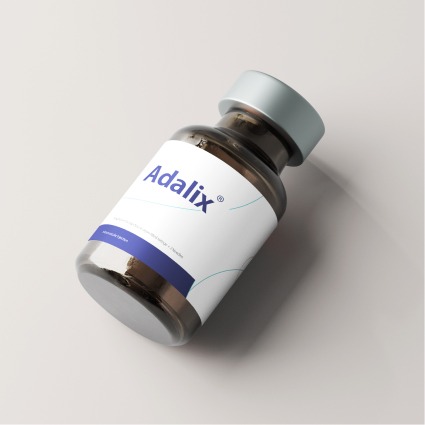Abstract
This article explores the molecular mechanisms by which Adalimumab inhibits tumor necrosis factor-alpha (TNF-α), a key pro-inflammatory cytokine involved in autoimmune diseases such as rheumatoid arthritis, Crohn’s disease, and psoriasis. Adalimumab’s role in modulating immune pathways is well documented in clinical trials and real-world settings. Recent studies provide insights into the binding kinetics, downstream signaling inhibition, and the clinical efficacy correlating with molecular impacts. The introduction of biosimilars has altered the economic landscape of Adalimumab, offered significant cost reductions, and expanded access to this vital therapy.
Introduction
Tumor Necrosis Factor-Alpha (TNF-α) is central to the inflammatory cascade in many autoimmune diseases. Elevated TNF-α levels correlate directly with disease severity in rheumatoid arthritis (RA), Crohn’s disease (CD), and psoriasis. In rheumatoid arthritis, TNF-α is overexpressed in the synovial fluid, reaching levels as high as 50 pg/mL compared to less than 5 pg/mL in healthy controls. This overexpression contributes to synovial inflammation, cartilage destruction, and bone erosion.
Adalimumab, a recombinant human monoclonal antibody, binds specifically to soluble and membrane-bound TNF-α, neutralizing its effects. First approved by the FDA in 2002 for the treatment of RA, Adalimumab has since gained approval for numerous autoimmune conditions owing to its potent anti-inflammatory effects.
Molecular Mechanisms of Adalimumab
Binding Affinity and TNF-α Neutralization
Adalimumab’s primary mechanism of action is neutralizing TNF-α through high-affinity binding. Studies have shown that It binds to TNF-α with a dissociation constant (Kd) of approximately 50 pM. This strong binding prevents TNF-α from interacting with its receptors, TNFR1 and TNFR2, on the surface of immune cells.
In vitro assays have demonstrated that Adalimumab inhibits TNF-α-induced NF-κB activation by up to 80% in synovial fibroblasts, directly reducing the expression of downstream cytokines such as IL-1, IL-6, and IL-8. Additionally, the drug inhibits TNF-α-induced apoptosis, protecting tissue from further inflammatory damage.
Downstream Signaling Inhibition
TNF-α exerts its effects by binding to TNFR1 and TNFR2, activating several downstream signaling pathways, including the NF-κB and MAPK pathways. Adalimumab blocks these pathways, reducing pro-inflammatory gene expression. Quantitative PCR analysis in patients with RA treated with Adalimumab has revealed a 70% reduction in the expression of pro-inflammatory cytokines, including IL-6, IL-17, and GM-CSF.
Moreover, studies using flow cytometry to evaluate immune cell populations have shown that Adalimumab induces a 40% reduction in CD4+ T cells expressing TNF-α compared to baseline levels before treatment.
Clinical Efficacy in Autoimmune Diseases
Rheumatoid Arthritis
The efficacy of Adalimumab in rheumatoid arthritis was demonstrated in the pivotal ARMADA trial (2002), where 50% of patients treated with Adalimumab achieved ACR20 (a 20% improvement in RA symptoms) after six months of treatment, compared to 10% in the placebo group. A two-year follow-up study showed a significant reduction in radiographic progression, with a 70% decrease in joint damage compared to methotrexate monotherapy.
Crohn’s Disease
In Crohn’s disease, the CHARM trial (2007) demonstrated that 40% of patients treated with Adalimumab achieved clinical remission at 56 weeks, compared to 17% in the placebo group. Additionally, as confirmed by endoscopy, 27% of patients achieved mucosal healing compared to just 8% in the placebo group.
Psoriasis
In the REVEAL trial (2008), 70% of patients with moderate to severe psoriasis treated with Adalimumab achieved a PASI-75 response (a 75% improvement in skin lesions) by week 16, compared to 7% in the placebo group. Long-term data show that 45% of patients maintained a PASI-90 response at 52 weeks, indicating sustained efficacy.
Safety Profile and Immunogenicity
Anti-Drug Antibodies (ADAs)
Developing anti-drug antibodies (ADAs) is a significant concern with biologic therapies. In long-term studies, 5-15% of patients treated with Adalimumab develop ADAs, which can reduce drug efficacy. In patients not receiving concomitant immunosuppressive therapy, such as methotrexate, ADA incidence rises to 25%.
Infections and Malignancies
TNF inhibitors heightened the risk of serious infections, including tuberculosis. Data from the ATLAS trial showed that 2% of patients receiving Adalimumab developed serious infections, compared to 0.5% in the placebo group. The long-term incidence of malignancies, particularly non-melanoma skin cancers, is approximately 0.6% in Adalimumab-treated patients.
Impact on Disease Progression
Radiographic Progression in Rheumatoid Arthritis
The PREMIER trial demonstrated that patients treated with Adalimumab and methotrexate had 70% less radiographic progression (measured by the total Sharp score) after two years than methotrexate alone. This finding underscores Adalimumab’s ability to control symptoms and slow the disease process.
Mucosal Healing in Crohn’s Disease
Long-term studies, such as the EXTEND trial (2010), have shown that 45% of patients treated with Adalimumab for Crohn’s disease achieved mucosal healing, compared to 18% in the placebo group. Mucosal healing is a critical marker of long-term remission and reduced complication rates in Crohn’s disease.
Pharmacoeconomic Considerations
Pharmacoeconomic studies have focused on the high cost of Adalimumab, particularly in chronic disease management. In the United States, the annual cost of Adalimumab therapy can exceed $60,000 per patient. However, the introduction of biosimilars has led to significant cost reductions. As of mid-2024, biosimilars such as Amjevita and Hyrimoz are available at 85-92% lower prices than Humira, leading to substantial savings for healthcare systems.
Conclusion
Adalimumab’s ability to inhibit TNF-α at the molecular level has revolutionized the treatment of autoimmune diseases. Clinical trial data and real-world evidence support its efficacy in reducing inflammation and preventing disease progression. However, the rise of biosimilars is set to reshape the economic landscape, making these therapies more accessible globally. Continued research into optimizing treatment regimens and understanding the long-term implications of TNF-α inhibition will further refine the role of Adalimumab in managing autoimmune diseases.

